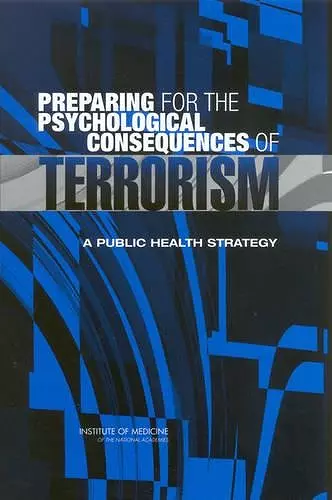Preparing for the Psychological Consequences of Terrorism
A Public Health Strategy
Institute of Medicine author Board on Neuroscience and Behavioral Health author Committee on Responding to the Psychological Consequences of Terrorism author Lewis R Goldfrank editor Allison M Panzer editor Adrienne Stith Butler editor
Format:Paperback
Publisher:National Academies Press
Published:26th Sep '03
Currently unavailable, and unfortunately no date known when it will be back

The Oklahoma City bombing, intentional crashing of airliners on September 11, 2001, and anthrax attacks in the fall of 2001 have made Americans acutely aware of the impacts of terrorism. These events and continued threats of terrorism have raised questions about the impact on the psychological health of the nation and how well the public health infrastructure is able to meet the psychological needs that will likely result. Preparing for the Psychological Consequences of Terrorism highlights some of the critical issues in responding to the psychological needs that result from terrorism and provides possible options for intervention. The committee offers an example for a public health strategy that may serve as a base from which plans to prevent and respond to the psychological consequences of a variety of terrorism events can be formulated. The report includes recommendations for the training and education of service providers, ensuring appropriate guidelines for the protection of service providers, and developing public health surveillance for preevent, event, and postevent factors related to psychological consequences.
Table of Contents- Front Matter
- Executive Summary
- 1. Introduction: Rationale for a Public Health Response to the Psychological Consequences of Terrorism
- 2. Understanding the Psychological Consequences of Traumatic Events, Disasters, and Terrorism
- 3. Current Infrastructure in the United States for Responding to the Psychological Consequences of Terrorism
- 4. Developing Strategies for Minimizing the Psychological Consequences of Terrorism Through Prevention, Intervention, and Health Promotion
- 5. Conclusions and Recommendations for Effective Prevention and Response
- References
- Appendix A: Data Sources and Methods
- Appendix B: Committee and Staff Biographies <
ISBN: 9780309089531
Dimensions: unknown
Weight: unknown
184 pages